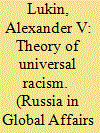| Srl | Item |
| 1 |
ID:
087655


|
|
|
|
|
| Publication |
2009.
|
| Summary/Abstract |
In September 2008, Russian President Dmitry Medvedev summed up his trip to the regions of the Far Eastern Federal Okrug (Territory) as follows: "There is a stark contrast between the region's natural beauty and its squalor. It has unique potential in terms of natural resource development, but this is hampered by a depressed, plodding, and extremely underdeveloped economic system."
The Far Eastern Federal Okrug is the largest in Russia. It occupies more than 36% of the country's territory, but accommodates less than 5% of the country's population. It is a region with extremely rich supplies of lumber and natural resources and with a unique flora and fauna. The Sakhalin shelves are rich in oil and gas, while the sea abounds in fish.
Its geopolitical position compels the government to regard the Far East not only as a territory that supplies diverse natural resources, but also as Russia's strategic springboard in the Pacific Basin, which offers favorable living conditions.
Alas, the size of the population in the Far East and Siberia, just as our country's population as a whole, has been declining for more than 15 years now. The demographic situation remains one of the most acute problems in these regions. At the beginning of 2008, approximately 6.5 million people lived in the Far East.
|
|
|
|
|
|
|
|
|
|
|
|
|
|
|
|
| 2 |
ID:
174881


|
|
|
|
|
| Summary/Abstract |
Today the Western world seems to be witnessing the approach of a new totalitarian all-embracing theory that warrants the analysis of any social and historical phenomenon strictly from a “racial” (or anti-racist) point of view. Accusations of racism have been extending from public life not only to individual branches of knowledge, but also to science as a whole. These trends provide some insight into how international relations theory will evolve in the United States and Europe. The ideology of universal racism essentially consolidates American centrism by extrapolating the local American and partially Western European problem of racism to the entire world history, inflating it to the extent where it turns into the main, dominant factor of social development. Relying on its own tradition and inherent international nature, the Russian scientific school, together with non-Western modern and traditional approaches, can play a leading role in the criticism of this new American centrism and reverse racism, while maintaining objectivity and normality in international relations studies.
|
|
|
|
|
|
|
|
|
|
|
|
|
|
|
|